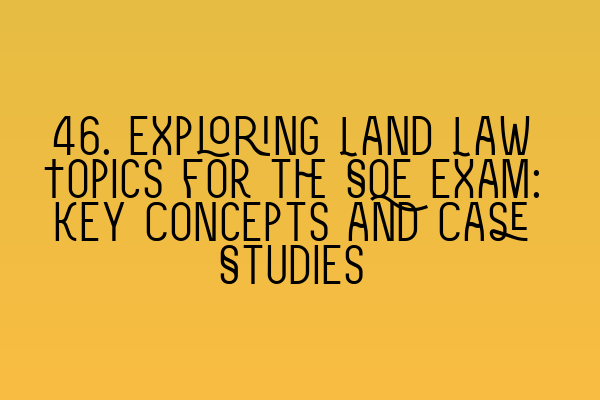46. Exploring Land Law Topics for the SQE Exam: Key Concepts and Case Studies
Welcome to another informative blog post from SQE Property Law & Land Law. In this post, we will dive into the key concepts and case studies related to Land Law that are essential for your SQE exam preparation. Whether you are a solicitor, aspiring solicitor, or a legal professional, this post aims to provide you with a comprehensive understanding of Land Law topics relevant to the SQE exam.
Understanding Land Law
Land Law is a fundamental area of law that governs the rights, interests, and obligations associated with land. It encompasses a wide range of topics, including property ownership, conveyancing, leases, mortgages, and easements. Being well-versed in Land Law is crucial for any aspiring solicitor, as property transactions are a common occurrence in legal practice.
Let’s explore some key Land Law concepts and case studies that you should focus on for the SQE exam. It is important to note that each concept or case study presented here is just a glimpse into the vast field of Land Law. A thorough understanding of Land Law requires further research and study.
Key Land Law Concepts
1. Freehold and Leasehold
A key distinction in Land Law is the difference between freehold and leasehold interests in land. Freehold refers to an absolute ownership interest in land, whereas leasehold refers to a temporary right to occupy land granted by a landlord. It is essential to understand the rights and obligations associated with each type of interest and how they affect property transactions.
2. Co-ownership
Co-ownership arises when two or more individuals have a shared interest in a property. Understanding the different types of co-ownership, such as joint tenancy and tenancy in common, is crucial. The concept of severance of joint tenancy and the implications it has on property rights should also be comprehended.
3. Registered and Unregistered Land
The Land Registration Act 2002 brought a significant change in how land ownership is registered in England and Wales. Understanding the registration process, the difference between registered and unregistered land, and the importance of title deeds is essential for a solicitor.
4. Easements and Covenants
Easements are rights that one party has over another’s land, such as a right of way or a right to access. Covenants, on the other hand, are legally binding obligations that run with the land. Understanding the creation, enforcement, and discharge of easements and covenants is crucial for advising clients on property transactions.
Land Law Case Studies
Case studies play a pivotal role in understanding Land Law concepts in practice. Here are a few notable case studies to familiarize yourself with:
1. Tulk v. Moxhay
Tulk v. Moxhay is a landmark case related to restrictive covenants. It established the principle that restrictive covenants can bind successors in title, even if they were not a party to the original agreement. This case is vital for understanding the enforceability and implications of restrictive covenants in property transactions.
2. Berrisford v. Mexfield Housing Cooperative Ltd
Berrisford v. Mexfield Housing Cooperative Ltd is a significant case that deals with the extent of a leasehold interest in a property. It clarified that a leasehold interest can be inherited and does not necessarily terminate upon the death of the leaseholder. Understanding this case will provide you with insights into the rights and limitations of leasehold interests.
3. Stack v. Dowden
Stack v. Dowden is an important case related to the division of beneficial ownership in co-owned properties. The judgment provided guidance on the factors to consider when determining the shares of co-owners in the absence of a formal declaration of trust. This case is crucial for understanding the complex issues surrounding co-ownership.
Preparing for the SQE Exam
Proper preparation is vital for success in the SQE exam. Apart from understanding the key concepts and case studies mentioned above, it is crucial to engage in regular practice, assess your knowledge with practice exam questions and mocks, and enroll in focused preparation courses.
For comprehensive SQE 1 and SQE 2 preparation, check out our related articles:
By utilizing these resources, you can enhance your understanding of Land Law and improve your chances of success in the SQE exam.
Remember, Land Law is a nuanced area of law that requires careful consideration of legal principles and practical applications. By delving deep into the key concepts and case studies, practicing regularly, and seeking professional guidance, you can develop a strong foundation in Land Law and excel in your legal career.
Stay tuned for more informative posts from SQE Property Law & Land Law, aimed at providing you with valuable insights for your SQE exam preparation.
